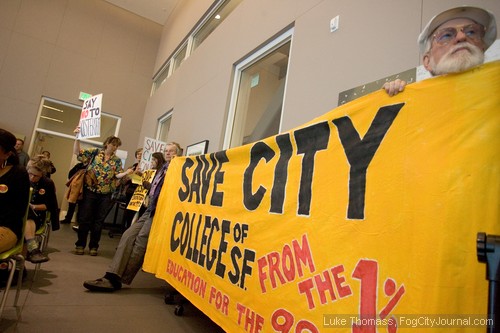
Occupy CCSF demonstrators attended a “board retreat” meeting Monday with the Board of Trustees and California Community College Chancellor Jack Scott to protest the decimation of public education in California. Photos by Luke Thomas.
August 8, 2012
Occupy City College protesters took to the podium at the beleaguered school Monday, decrying the loss of open access and the decimation of public education across the state, at a retreat attended by the Board of Trustees and state community college officials.
California Community College Chancellor Jack Scott, who sets statewide college policy along with Board of Governors President Scott Himelstein, also in attendance, was at City College to offer his support and advice in the college’s struggle with accreditation.
Though the meeting was dubbed a “board retreat,” it was more plainly a meeting to address dire concerns at CCSF.
The college was sanctioned in June with a “show cause” rating by the Association of California Community and Junior Colleges, telling the school it needs to shape up by October, and then ultimately by March, or it will lose its accreditation – necessary to receive federal aid, and for its degrees to be recognized.
The accreditation agency found fourteen specific problem areas at the college, mostly centering around not living within its fiscal means, re-evaluating its core mission of which students to serve, streamlining its system of governance, and measuring student’s learning and performance.
Inside the meeting room, faculty staff and students filled the seats. Outside, protesters carried signs outside that read, “Save City College from the 1%, education for the 99%,” singing and chanting and later filing into the meeting room to listen to the state chancellor speak.
“If I were king for a day, I’d say City College should get all the money back it lost three years ago,” Scott said. If you don’t spend according to your budget, he said, “one day the day of reckoning comes.”
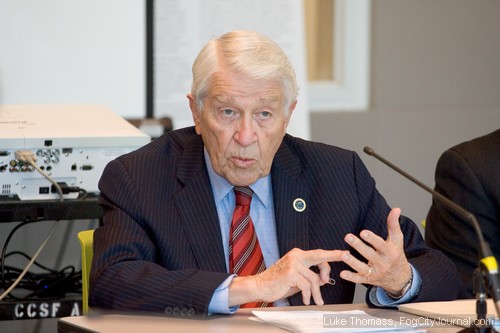
California Community College Chancellor Jack Scott.
Many in the audience hissed as he finished his sentence.
College Board Trustee Chris Jackson was the only board member who spoke in opposition to the accrediting team’s recommendations. The team recommended re-evaluating their mission in terms of fiscal uncertainty, he said. But, “I support our current mission. If you don’t get into a UC, if you don’t get into a CSU, where can you go? We’re the safety net.”
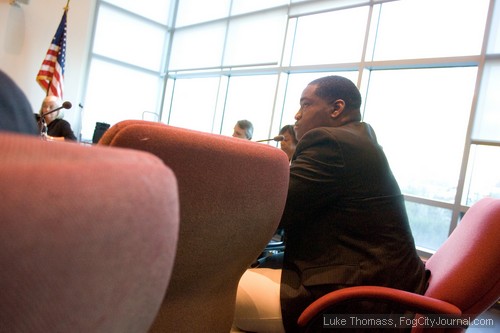
College Board Trustee Chris Jackson.
Scott’s main recommendation to the Board was to simply accept the accrediting team’s recommendations, and leave the arguing behind.
Vice Chancellor of Administration and Finance Peter Goldstein, an administrator with unprecedented experience at City College, put the arguing in context.
“When there’s only one dinner roll, the family’s table manners change,” Goldstein told FCJ, referring to the finger pointing and infighting between faculty, administration and the Board.
Is the money coming back?
“Since the state’s not (funding us), we can’t manufacture money,” Scott said. And as far as restructuring the mission goes, he reminded the Board that the state legislature said not to cut transfer students, or career tech students.
Occupy City College member and student Kitty Lui had a different view of Scott’s presentation.
Standing at the podium during public comment, she said that in light of his acceptance of the governor’s tax initiative (Proposition 30), she believed everything he had said through the night were “crocodile tears.”
Proposition 30 is a compromise between Gov. Jerry Brown and the unions of California, who were pushing their “Millionaire’s Tax.” The new proposition contains elements of both tax plans, something that the Occupy CCSF students view as a “betrayal.”
If Prop 30 fails to pass, the community college system of the state would see hundreds of millions of dollars in additional budget cuts, and City College could expect to see a shortfall of another $10 million, roughly five percent of its’ budget, Goldstein said.
The new fiscal reality has given birth to “out of the box” thinking on new ways to raise revenue. Alisa Messer, president of the AFT 2121 teachers union at City College, suggested new fundraising efforts from Bay Area billionaires.
“It’s hard to look around the state and public education in general in California and not realize that we’re in a pretty horrid mess,” Messer told FCJ, adding that CCSF lost $17 million in funding in 2011 due to state budget cuts. “We’re just bleeding state funding, but we’re still trying to run the same program – we’re supposed to be the college that’s open to everybody.”
“My question is, this is a taxpayers’ supported institution. It’s here for the public, so is this the kind of institution that we want a Bill Gates to step in and save with $50 million?” Messer added. “Public education is an investment in all of California’s future and City College is an investment in the Bay Area and in San Francisco’s future. It is absolutely about values and it’s about priorities. We know what a difference it makes when we have an educated populace.”
The mayor’s office has discussed the importance of tech training at City College with college leaders, said Board Trustee Natalie Berg, who thinks they could possibly be a source of revenue as well. And though more taxes is not new, the college has a parcel tax on the November ballot (Proposition A), which could provide an estimated $14 million in annual revenues to the college.
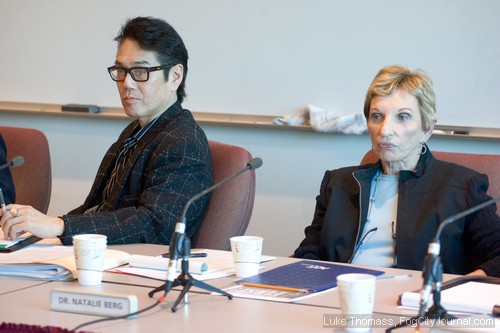
Board Trustees Lawrence Wong and Natalie Berg.
Most of the Board however seemed more concerned about getting feedback from Scott in the coming months. Trustees Lawrence Wong and Anita Grier asked for his future counsel, and Scott agreed to offer whatever help he could.
Where are the students?
Student Trustee William Walker used the public forum as an opportunity to criticize one aspect of City College’s new workgroups, the 12 groups formed to help solve the accreditation problem.
“There are only two students on these work groups,” Walker said, concerned about the lack of urgency of the college’s Chancellor to recruit students for the groups.
CCSF Chancellor Pamila Fisher said the main obstacle was lower student enrollment in the summer season, and that students were not readily available.
Students in the audience disagreed.
“I really didn’t like Dr. Fisher’s comment about there not being a lot of students to help out,” said student Ana Burns. “That’s wholly not true.” Burns is also an Associated Students council member. She and several students had written to Walker in order to “put their names in the hat” to be chosen for the workgroups.
They never heard back from Fisher.
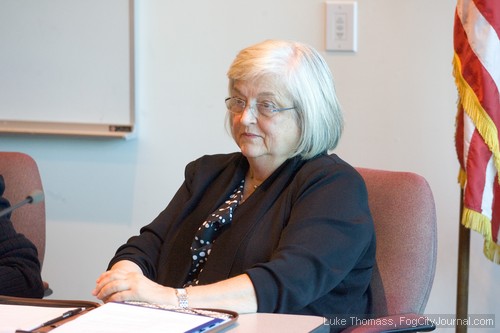
CCSF Chancellor Pamila Fisher.
“Administration could be finding students if they wanted to do the right thing,” Associated Students Vice President student Josh Beisiegel said. “I would say they haven’t done enough.”
“That goes equally if not more than the Board of Trustees.They’ve not been fulfilling their duties, doing their jobs. They’re not living up to my expectations as a citizen of San Francisco, a student of City College, and now a vice president of the Ocean Campus Council.”
Four members are up for re-election on the Board, so would you vote for them? “I think at this time, they’ve basically proven what they’re capable of,” Burns said. “We need to get the message out, so few know about accreditation, and when they find all the details, they’ll be hard pressed not to help out in some way.”
City College spokesperson Larry Kamer said the school is doing just that. Starting today, advertisements will begin hitting CBS news, the San Francisco Bay Guardian newspaper, and community newspapers across San Francisco.
While that may spell good news for raising student participation, Burns had one last observation to make about the public comment period, where students voiced their concerns.
“I think they were laughing at everything,” Burns said. “I was planning on speaking, but the thing is, I don’t want my voice to be lost among things that aren’t as relevant… which made the trustees kind of close their ears to everyone talking.”
“I want to make sure when I talk, they’ll listen,” Burns added.
More Photos
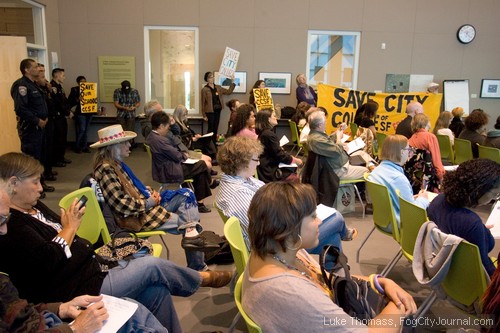
Meeting attendees included members of the public, faculty, students, protesters and administrators.
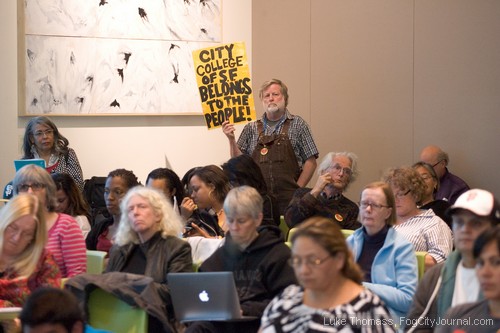
“City College of SF Belongs to The People.”
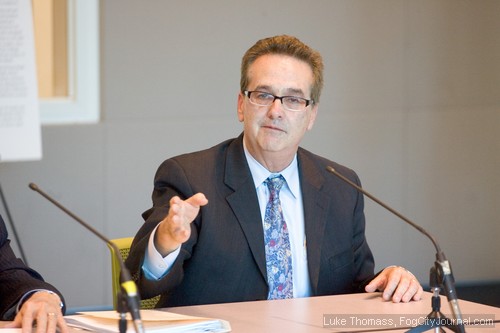
Board of Governors President Scott Himelstein.
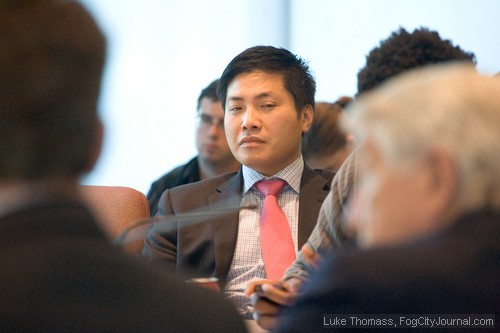
Board Trustee Steve Ngo.
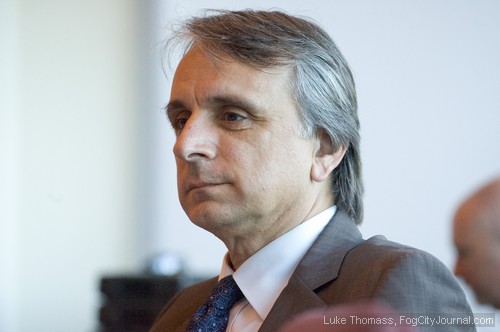
Board Trustee John Rizzo.
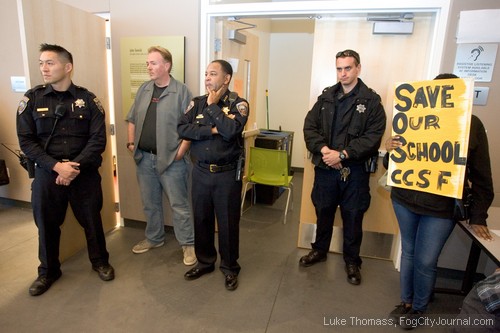
“Save Our School CCSF.”



 The Hunger Site
The Hunger Site
August 9, 2012 at 7:31 am
City College needs to make hard decisions as to what its purpose and mission should be. It appears as if it is trying to do too much, and has lost its way. CCSF needs to re-think all of the satellite centers, non-academic classes,etc that are not part of the core mission. Once they trim these peripheral missions and get back to basics, they will be more efficient and better serve their constituents. But no one seems to have the guts to say “no” to any program. In this way it is not much different than other government programs, where politicians say yes to additonal benefits, but don’t bother to think about how they will be paid for.
August 8, 2012 at 9:55 am
Unfortunately the parcel tax, the text of which does not say what the money would be used for other than to ‘save’ CCSF will be passed by the renters who don’t have to pay for it. It will be another large amount of money flushed down the toilet by the incompetent trustees and faculty. These taxes that are passed by people not paying for them make me so angry.
August 8, 2012 at 9:36 pm
For generations of people who did not do well in high school, City college was a life saver. Many of us discovered that we DID do well in college. Without the mind numbing drills and idiotic social scene, we could focus on learning the material at hand, much of which turned out to be fascinating. Many of us went on to four year univesities, and some wet even further. City college has been a gosend also for students with hidden and not hidden disabilities. ven people who had made a mess of theire lives, with drug addiction and prison in their backgrounds, found that they could learn, get jobs, and give back to society.
Now, with high schools totaly failing, universitys far too expensive to be acesible ,to many, and unskilled jobs few and far between, the youth of today fac fewer and fewer options, More and more of them will slip into the endless cycle of homelessness, jails, and even prison. And this will NOT save the taxpayers money.
City collge’ss is being chalenged based on lack of funding (which was just cut) and to few administrators. Nobody is chalenging the quality of the education itself, which is, to my mind, the only chalenge that warents possible lack of acreditation. We should do the right ting and do what we can do save this invaluable resource.
August 10, 2012 at 7:47 am
My experience was different. I found the school at Ocean campus to be everything you mentioned you were getting away from when you left high school.This place was just like high school except here the teachers could do whatever the hell they wanted to do without having to worry about being held accountable for it which put the students in a position of having to cater to them. That’s not what college is supposed to be about at all. A college class is supposed to empower students to achieve or not achieve based on their own willingness to learn the material not there willingness to cater to their instructor’s incredible ego. I found the culture here to be rarely geared towards the education of the individual student and more often than not focused on anything else besides that.I hope the professors I had there are worried about their jobs, because they should be. Bums.
Sent from my Samsung Galaxy Note™, an AT&T LTE smartphone
August 11, 2012 at 1:51 pm
Universal manhood suffrage sure is a bitch, sometimes.